- Home
- Susan Hill
A Kind Man
A Kind Man Read online
About the Book
‘Susan Hill is a writer of striking versatility’ Saturday Telegraph
‘One of our finest novelists’ Sunday Times
‘Hill can evoke a setting, convey the essence of a situation and let one see into the inmost hearts of her characters in a single paragraph or sentence’ Spectator
Tommy Carr was a kind man; Eve had been able to tell that within half an hour of knowing him. There was never a day when he didn’t show her some small kindness and even after the tragic death of their young daughter, their relationship remained as strong as before. Grief takes its toll however, and it’s not surprising that by the following Christmas, Tommy is a shadow of his former self, with the look of death upon him. But what happens next is entirely unexpected, not least for the kind man… Greed, goodness, and an extraordinary miracle…
A Kind Man
Susan Hill
Contents
Cover
About the Book
Title
Copyright
By the Same Author
Chapter 1
Chapter 2
Chapter 3
Chapter 4
Chapter 5
Chapter 6
Chapter 7
Chapter 8
Chapter 9
Chapter 10
Chapter 11
Chapter 12
Chapter 13
Chapter 14
Chapter 15
Chapter 16
Chapter 17
Chapter 18
Chapter 19
Chapter 20
Chapter 21
Chapter 22
Chapter 23
Chapter 24
Chapter 25
This eBook is copyright material and must not be copied, reproduced, transferred, distributed, leased, licensed or publicly performed or used in any way except as specifically permitted in writing by the publishers, as allowed under the terms and conditions under which it was purchased or as strictly permitted by applicable copyright law. Any unauthorised distribution or use of this text may be a direct infringement of the author’s and publisher’s rights and those responsible may be liable in law accordingly.
Version 1.0
Epub ISBN 9781446402276
www.randomhouse.co.uk
Published by Chatto & Windus 2011
2 4 6 8 10 9 7 5 3 1
Copyright © Long Barn Books Limited 2011
Susan Hill has asserted her right under the Copyright, Designs and Patents Act 1988 to be identified as the author of this work
This book is sold subject to the condition that it shall not, by way of trade or otherwise, be lent, resold, hired out, or otherwise circulated without the publisher’s prior consent in any form of binding or cover other than that in which it is published and without a similar condition, including this condition, being imposed on the subsequent purchaser.
First published in Great Britain in 2011 by
Chatto & Windus
Random House, 20 Vauxhall Bridge Road,
London SW1V 2SA
www.rbooks.co.uk
Addresses for companies within The Random House Group Limited can be found at: www.randomhouse.co.uk/offices.htm
The Random House Group Limited Reg. No. 954009
A CIP catalogue record for this book is available from the British Library
ISBN 9780701185916
BY THE SAME AUTHOR
Fiction
Gentleman and Ladies
A Change for the Better
I’m the King of the Castle
The Albatross and Other Stories
Strange Meeting
The Bird of Night
A Bit of Singing and Dancing
In the Springtime of the Year
The Woman in Black
Mrs De Winter
The Mist in the Mirror
Air and Angels
The Service of Clouds
The Boy Who Taught the Beekeeper to Read
The Man in the Picture
The Beacon
The Small Hand
Non-Fiction
The Magic Apple Tree
Family
Howards End is on the Landing
The Simon Serrailler Crime Novels
The Various Haunts of Men
The Pure in Heart
The Risk of Darkness
The Vows of Silence
The Shadows in the Street
For Children
The Battle for Gullywith
1
WHEN HE had left she lay awake, the curtains still drawn together, and prayed that it would not be fine, as it always was on this day. But she could tell even through the lined blue cotton that the sun was shining. She closed her eyes for a second, against it.
There were fields then, it was all fields, and the track led directly across them from their garden gate to where it sloped up to the peak, a dry track, sometimes brown sometimes sandy sometimes grey, according to the season and the weather, but never green and grassed over.
She looked at the peak, touched by the sun.
Then she washed and brushed her hair, coiled it up and pinned it, and at last went downstairs.
The spray of plum blossom was on the kitchen table, thickly clotted white and set carefully in the best china jug, as usual. She touched the petals, but they were too delicate for the roughened pad of her forefinger to feel them.
The sunlight touched them as it touched the peak.
Nothing would be said.
The tin bowl of scraps and meal was on the ledge, waiting from the previous night when she had filled it, last thing before going up to bed, the chickens being her job and nothing to do with Tommy at all except for the wringing of necks. She used to do that. She had done a lot of things.
Once she had unlatched the door and stepped outside and felt the sun on her face and that the sun had a little warmth in it, she did not mind it after all and forgot she had prayed for rain and greyness. And that was as always too.
The past winter had been hard. Christmas was wild gales and then the snow had come straight after and piled up against the door and the henhouse, the fence and the gate. Tommy had had to dig himself a path out in the morning so that he could get to work, and the fields had been a foot deep in it, he had to set off an hour early just to be sure of making the time. From late grey dawns to early sunset the wind had blown at the cottage from the north-east, finding out every hair’s-breadth crack and crevice in windows and door and roof slates, even, it sometimes felt, in the walls themselves. The range had been full all day and all night, gobbling up the fuel and yet never seeming to get warm. He had lit a fire in the front room too, but even when that had blazed up, drawn by the brisk wind down the chimney, their breath had been white as ghost-breath on the air, a yard distance from the hearth. The inside of every window was glazed with ice, the icicles hung down, gleaming crystal spikes, and the chickens’ water dish had to be hammered until the shards flew. Eve had sat huddled over the range, fringing scarves with stiff, sore fingers.
The chickens started up as she opened the door, clucking round in circles and, as she approached down the path to their pen, flapping their wings. It was difficult to empty the tin, they tried to attack it and her so vigorously, but once the first scraps were on the ground and they were pecking at them, she could step back and enjoy it. Tommy had long given up puzzling out why she liked them, gave them names, admired the gleam on their feathers and their strutting and jerky movements. ‘Only you don’t mind them in the oven or on the plate,’ he often said. But that was different, it was the way of things. It was just the killing she could no longer do. That and other things.
She stood for some time, alternately watching the fowl and looking round her, looking at the beginnings of
the year’s kitchen garden taking shape, the first rows freshly dug, the bean canes he had started tying, and then beyond, at the field and the track and the sunlight on the peak.
It was all fields then.
2
HER NAME had been Eve Gooch and she had lived in Water Street which ran alongside the canal. The bedroom she shared with her sister Miriam had looked onto it. Every morning when the curtains were drawn back there was the wide, black-shining water moving soundlessly past. Occasionally you saw a duck or even a swan, often a barge pulling coal or scrap metal, but otherwise there was only the dark, slick water.
She left at seven to meet three others on the corner from where they walked, arm in arm and head-scarved, across town to the pottery. Miriam went the other way to the printworks. Their mother stayed at home. Their father was dead before Miriam was four years old. She barely remembered him. Eve had a recollection of a man with stubble beard and smelling of clean carbolic soap, a man with a loud voice but a calm way. And then he was gone.
Miriam had met hers first. John Bullard, very tall, very thin, with a long nose and an odd turn in his eye, John Bullard who spoke very little, smiled instead, or nodded or shook his head.
‘How did you ever get him to look round at you, least of all ask you out?’ Eve had said when her sister had first come home to wash all over and change into her lemon silk blouse. ‘How did he make himself understood?’
Miriam had reddened and turned her back in their small room, but later, going down the stairs in her best shoes, she had said, ‘He can be quite talkative when he likes.’
Eve and their mother had exchanged glances. ‘He can be quite talkative.’ Disbelief, the inability to apply the description to John Bullard, had united them as few things did.
Afterwards, Eve thought that she had willed Tommy Carr into her life because of her dread of being left alone with their mother when Miriam married. They were only fifteen months apart in age – Eve the elder – and she never once begrudged Miriam her husband-to-be, their house, their future, only, without ever forming it into so many words, determined that she, would follow on.
There had been whistles and looks and quiet handholding at dances in the Victoria Hall and once, an arm round her shoulders and a quick kiss on a ride at All Hallows Fair, but no one who had taken to her, no one she had given a second glance.
John Bullard had come to tea twice a week and he and Miriam had taken over the front room, but with the door always kept ajar as their mother insisted, though Eve had no interest in prying and spying and kept to the bedroom or went out. It was late summer and still hot in the days, with soft balmy evenings, so that she could walk to the far end of the street and then cut down the snicket to the canal towpath, where there were always people strolling, couples, men on their way to and from the pubs and the Legion, children playing out late, boys fishing. She liked the sense of comradeship on these evenings, everyone belonging to the same place, working and living and playing and walking, so that they exchanged a word and a greeting whether they knew one another by name or sight or not. Because they belonged. Eve never felt this at other times. She had no real sense of where she lived, no affiliation to it. It was. She lived and worked here, always had, so always would and that was all there was to it.
But on these late-summer evenings it was different. There was something in the air of the place that gave her small spurts of a hopefulness and promise, an excitement even, that were otherwise unfamiliar.
Miriam and John Bullard were married when the evenings had drawn in and there were the first frosts, but the day had been clear and bright with sunshine that made everything hard-edged. It had been a rush of working until well into every night to get the wedding dress and Eve’s dress finished, the sewing machine trundling for hours and the kitchen table covered with a sheet and then with the white lace and the blue satin, the tin of pins and the box of buttons and the sprays of artificial mimosa and pearls sewn onto a headband that held the veil.
Eve wore the blue satin with a small hat pinned perilously to the side of her head.
John Bullard’s suit was shiny and his hair shone too, flattened well down, which emphasised his nose and the boniness of his face. His hands were huge, Eve noticed, as he held her sister’s to fit the ring.
They left at three, driven to the station by John Bullard’s uncle, and by five people had left and the church hall was a mess of cake crumbs and empty cups. A streamer which had hung across the room had come unpinned and was dangling down and her footsteps made a hollow tapping sound on the boards as she helped to clear up.
Her mother had drunk three glasses of sherry and her eyes were too bright. Eve felt odd and dispirited.
So that was a wedding, she thought.
A week later, she met Tommy Carr, and afterwards, she had felt as if everything was falling out as easily as the cards can fall out suddenly, in a game of patience, one after another after another into place. It had been quite straightforward. She had to take a skirt her mother had altered to a woman who lived on the east side of the town and she went by the canal path and was walking towards the footbridge when a stray dog came racing towards her and stopped, to whirl barking and barking round her feet. The skirt was wrapped in brown paper and tied with string and in her efforts to be free of the barking dog she had slipped. She had righted herself at once but the parcel had flown from her hand into the canal and the dog had leaped into the water after it, still barking, swimming as it had jumped, round and round in an ecstasy of excitement.
The dog’s owner had reached her at the same moment as a man had run down the steps of the footbridge and together, while Eve watched, they had hooked the parcel with an overhanging tree branch they had snapped off. After the parcel, swung dripping with water onto the path, had come the dog, hauled by its collar. Eve had seen its legs paddling furiously and then its open mouth as it had scrambled out of the canal. The dog had seemed to be laughing, its bark interrupted by an abrupt cough as it spat out a mouthful of water.
And then it was over and calm and the dog was gone and Eve was left looking in dismay at the soaking wet brown-paper parcel on the path.
A couple of years before, Nelly Holmes, her mother’s oldest friend, had thought of remarrying. It had been a long time since she had lost her husband and hard bringing up three boys alone. He had asked. She had hesitated. Come to their house.
They had all been in, sitting round the table after tea, with scarves laid out for fringing and a sheet to hem. But Miriam had been delaying, wanting her game of patience to come out and it would not.
‘No, no, don’t send them off,’ Nelly Holmes had said, sitting down and catching her breath, stout woman that she was. ‘It isn’t private.’ Though it was, they could tell straight away, and their mother had kept glancing at them uneasily for fear of them catching a phrase they shouldn’t hear.
Miriam had gone on trying to get the patience out, not interested. Eve had fiddled with the scarf, wishing she could leave, not quite knowing how, not wanting to hear the talk, embarrassed, though that precise word was not known to her then.
But after a moment, she had begun to listen and to think about Nelly Holmes, with her three growing boys in the tiny terrace house, toilet at the far end of the narrow garden, precious little money.
‘It might make such a difference,’ she was saying, ‘such a difference. They need a man about the place and it would be a wage. Besides, I’d like some company.’
And there was more, this good reason and that. Vera Gooch had listened in silence, looking at her friend’s face now and then but letting her come to the end like a thread running out and the shuttle gradually slowing to a halt.
The room had subsided into quiet. Miriam’s cards made a soft pat as she set them down one by one.
At last, Vera had got up. The old cat was at the window waiting to be let in.
Vera had looked round at Nelly Holmes. ‘Only the one thing I’d ask,’ she had said. ‘Which you maybe haven’t thought
of or can even answer and you should.’
Not only Nelly, but Eve and Miriam too waited now, looking at her, Miriam’s hand frozen on the cards.
‘Is he a kind man?’
Somehow, it took them all by surprise. It was not what they had been expecting, which had perhaps been a thought of money or work or an existing family, where they might live, Nelly Holmes’s old father. Any of that.
Is he a kind man?
Yet Eve had seen at once that it was the only question that mattered and contained everything else within itself and Nelly’s reply.
Is he a kind man?
The rest would follow. Or it would not.
3
TOMMY CARR was a kind man, she had been able to tell that after half an hour of knowing him – kind to help her unpack the parcel and see that the skirt inside was not even damp, kind to suggest that she fold it carefully and take it as it was, not so much as mentioning the paper and string. Kind to come with her in case the woman whose skirt it was might chastise or blame her, and then he could help Eve explain. Kind to walk home with her just to the end of the street but no further, so as to spare her any looks and questions.
Kind.
And so it had been, she thought, looking at the sprays of plum blossom he had left ready for her in the jug, as always, and knowing what he felt without a word needing to be said. There had never been a day when he had not shown her some small kindness or spoken a kind word. It was what he was and not only to her, it was his nature, everyone said so. People spoke of him as kind Tommy Carr. He had been a kind boy, they said, his mother and aunt and neighbours and friends and workpeople who had known him all his life, kind to smaller children, to creatures, to someone hurt or shy or who caught the wrong end of the teacher’s tongue or the flat blade of the ruler.
There was nothing else memorable about him. He was neither good- nor bad-looking. He had short straight brown hair and a pleasant face you forgot the moment you turned your back. If you wanted to point out anything it would be the pale scar across his upper lip where he had been bitten by a ferret. He was neither tall nor short, he was thin but not awkwardly so. There was nothing in the way he moved to distinguish him. But his voice was quiet and he never wasted words. Words, he said, could be dangerous and too little respected.

 Mrs De Winter
Mrs De Winter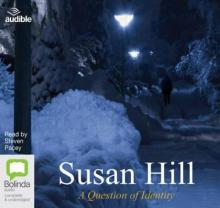 A Question of Identity
A Question of Identity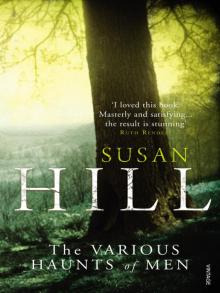 The Various Haunts of Men
The Various Haunts of Men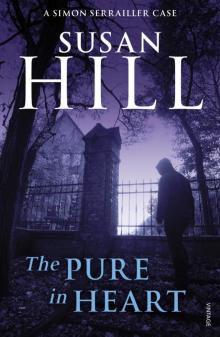 The Pure in Heart
The Pure in Heart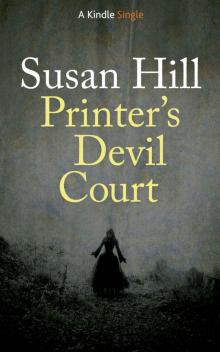 Printer's Devil Court
Printer's Devil Court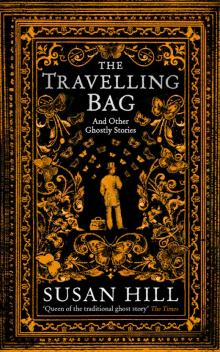 The Travelling Bag
The Travelling Bag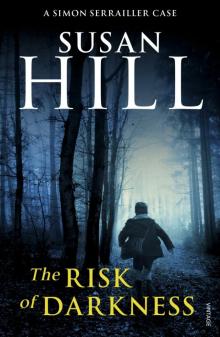 The Risk of Darkness
The Risk of Darkness A Kind Man
A Kind Man Black Sheep
Black Sheep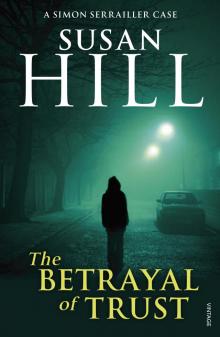 The Betrayal of Trust
The Betrayal of Trust The Service of Clouds
The Service of Clouds Betrayal of Trust
Betrayal of Trust The Small Hand
The Small Hand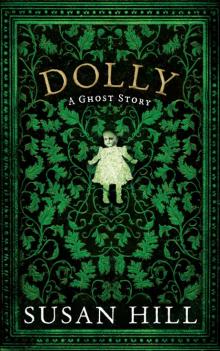 Dolly
Dolly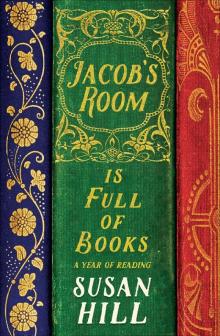 Jacob's Room Is Full of Books: A Year of Reading
Jacob's Room Is Full of Books: A Year of Reading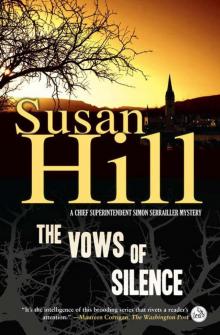 The Vows of Silence
The Vows of Silence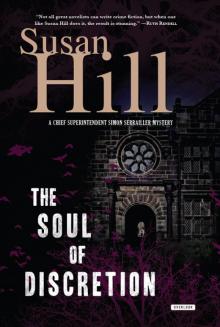 The Soul of Discretion
The Soul of Discretion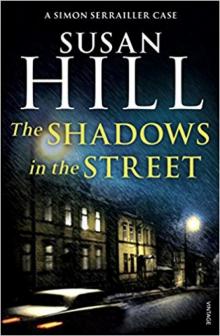 The Shadows in the Street
The Shadows in the Street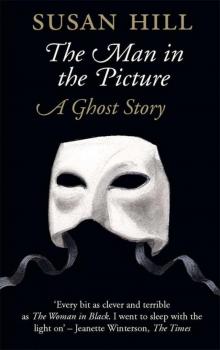 The Man in the Picture
The Man in the Picture Air and Angels
Air and Angels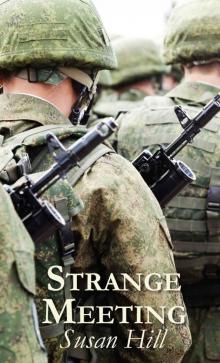 Strange Meeting
Strange Meeting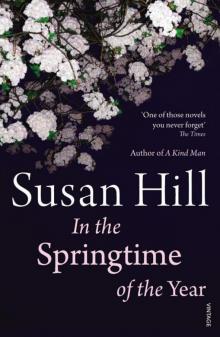 In the Springtime of the Year
In the Springtime of the Year Howards End Is on the Landing: A Year of Reading From Home
Howards End Is on the Landing: A Year of Reading From Home From the Heart
From the Heart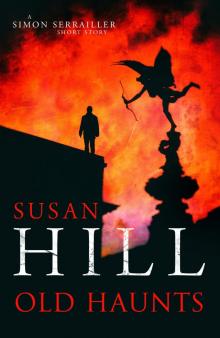 Old Haunts
Old Haunts The Mist in the Mirror
The Mist in the Mirror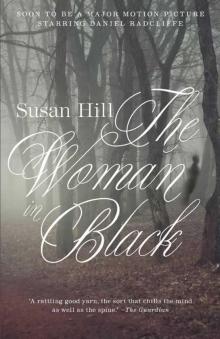 The Woman in Black: A Ghost Story
The Woman in Black: A Ghost Story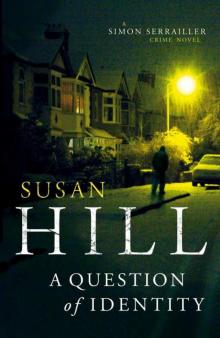 A Question of Identity (Simon Serrailler 7)
A Question of Identity (Simon Serrailler 7)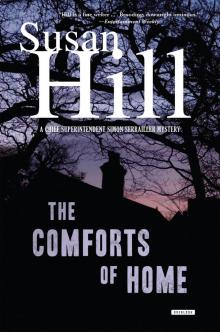 The Comforts of Home
The Comforts of Home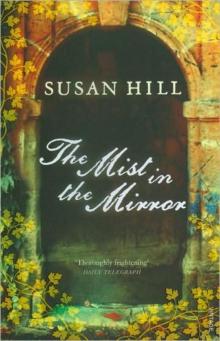 Mist in the Mirror
Mist in the Mirror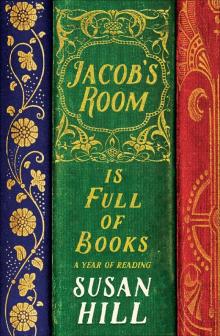 Jacob's Room is Full of Books
Jacob's Room is Full of Books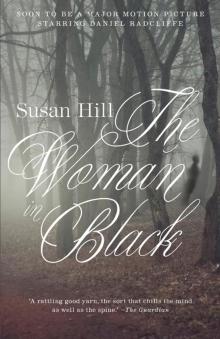 The Woman in Black
The Woman in Black Howards End is on the Landing
Howards End is on the Landing